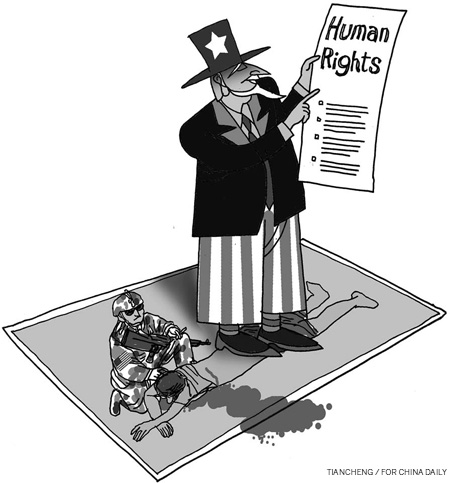Op-Ed Contributors
Human rights progress enjoyed by all
(China Daily)
Updated: 2011-04-21 07:56
 |
Large Medium Small |
As one of the central tasks of the Chinese government, improving human rights is confronted with more challenges coming along with China's social and economic transformation.
China's Human Rights in Action (2008-2009), an informative book, edited by the China Society for Human Rights Studies (CSHRS) and published by China Intercontinental Press, provides a record of China's progress in human rights in 2008 and 2009.
The book highlights two milestones in China's human rights cause in the past two years. The first was President Hu Jintao's letter to the CSHRS on the 60th anniversary of the Universal Declaration of Human Rights in 2008. Outlining the historical experience in safeguarding human rights in China since the implementation of reform and opening-up policies, Hu said respecting and protecting human rights was a bedrock principle of governance. He said it was necessary to put the safeguarding of people's right to subsistence and development at the top of the agenda for safeguarding human rights in the light of China's conditions.
The second was the country's adoption of the National Human Rights Action Plan (2009-2010), which aimed at improving laws and regulations upholding human rights and encouraged the coordinated development of economic, social and cultural rights, along with civil and political rights. It highlighted specific objectives and practical approaches to realize these goals in 2009 and 2010.
Knowing China's national conditions as a developing country is the key to understand human rights issues in the country. The Wenchuan earthquake and global financial crisis marked 2008 and 2009 as special periods for the Chinese government in its efforts to improve human rights in the country. Governments at various levels have taken special measures to protect people's lives and properties in the event of natural disasters and efforts have been made to create jobs and stabilize the economy for the welfare of the public in the wake of the global financial crisis, which has contributed to the stability of world economy as well.
The Chinese authorities have also attached more significance to juridical protection and citizens' right to know in the past two years, and rapid progress has been made in people's participation and supervision rights.
China's Human Rights in Action also gives a detailed description of the unremitting efforts of the Chinese government to protect the rights of disadvantaged groups, such as ethnic minorities, women, children, senior citizens and handicapped people. The editors also face up boldly to some practical problems, including food safety, discrimination against sickness and labor conditions, which were among the main concerns of people nationwide. Solving these problems entails systematic action from various parties. The times when the authorities could ignore problems and conceal facts have gone forever. The dazzling economic growth of China is built on the collective wisdom that has successfully solved any problems that have arisen and such problems will be solved in the same way.
The global financial crisis has unified the actions of governments around the world in many fields. This includes China. But it is also doing more. China not only stands out as the leading driver of the global economic recovery, it is also taking an active part in global governance. As required by demands from home and abroad, China has sincerely opened its door to constructive international human rights cooperation and dialogue.
China is much more open-minded than it used to be in interpreting and practicing human rights. The Western censure of China's human rights is disingenuous and laden with self-conceit and prejudice.
The Chinese government is dedicated to cultivating social consensus on human rights protection among all citizens and, as a responsible member of the global village China is a participant in many international humanitarian projects. China's human-oriented Scientific Outlook on Development is an innovative governance principle that integrates human rights into almost every area of social life and which effectively adds to China's adaptability to changing circumstances, as it is the Chinese people who know China best and how to protect and improve their own human rights.

| 分享按钮 |